“Points” are unsustainable.
The EIGEN airdrop sparked a discussion about the rift between private and public markets. The model based on points, large private financing, and high FDV airdrops is causing structural problems for the crypto industry.
Turning a points scheme into a multi-billion dollar, low-volume token is not a stable equilibrium, but we still find ourselves caught in a confluence of factors: an overabundance of venture capital, a lack of new entrants, and overbearing regulators.
The narrative around token launches is always changing, here are the major eras we’ve seen:
• 2013: PoW fork and fair launch
• 2017: ICO
• 2020: Liquidity mining era (DeFi Summer)
•2021: NFT Mint
•2024: Points and Airdrops
Every new token distribution mechanism has its pros and cons. Sadly, this particular meta begins in a place of structural retail disadvantage, a natural result of the unforgiving regulatory spotlight hovering over the industry.
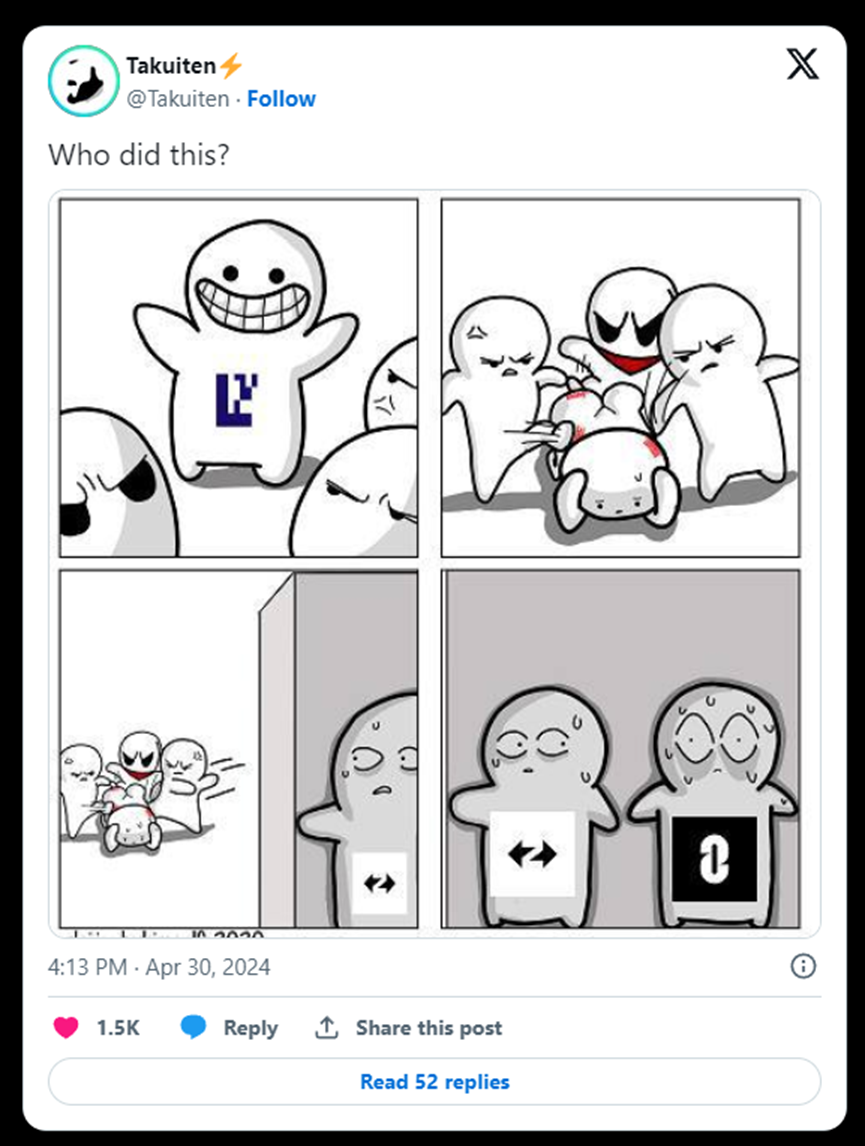
https://x.com/Takuiten/status/1785220889161998635
A large number of venture capital and retail investors
There is currently an oversupply of venture capital in the crypto industry. Although 2023 was a bad year for venture capital financing, there was still a lot of funding in 2021, and venture financing in the cryptocurrency space in general is a continuous activity.
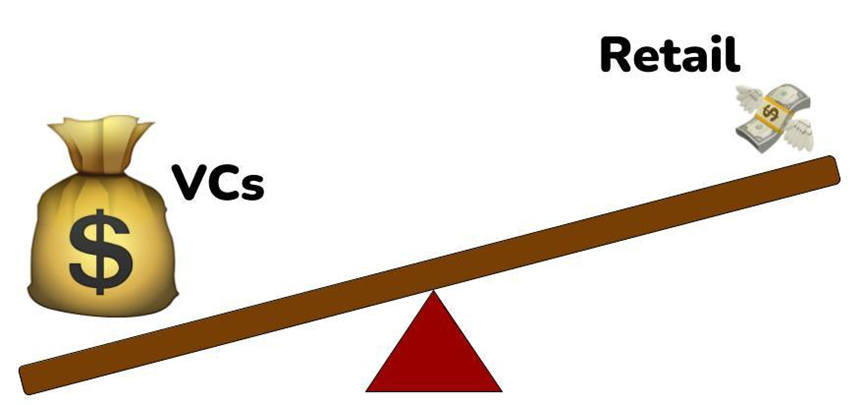
The fact that a large number of well-funded VCs are still willing to lead rounds at multi-billion dollar valuations means that crypto startups have room to stay private for longer and longer periods of time. This certainly makes sense, because if tokens are currently being offered at multiples of the last funding round, even late-stage VCs can still find a good deal.
The problem is that by the time a startup issues a public token for $1-10 billion, most of the upside has already been discovered by the early parties — i.e., no one is going to get rich by buying $10 billion worth of tokens.
The mood in the crypto industry is deteriorating as it is structurally disadvantaged to public market capital.
People want to get rich with their online friends and form strong online communities and friendships around this activity. This is the promise of cryptocurrency, and it has not yet been fulfilled.
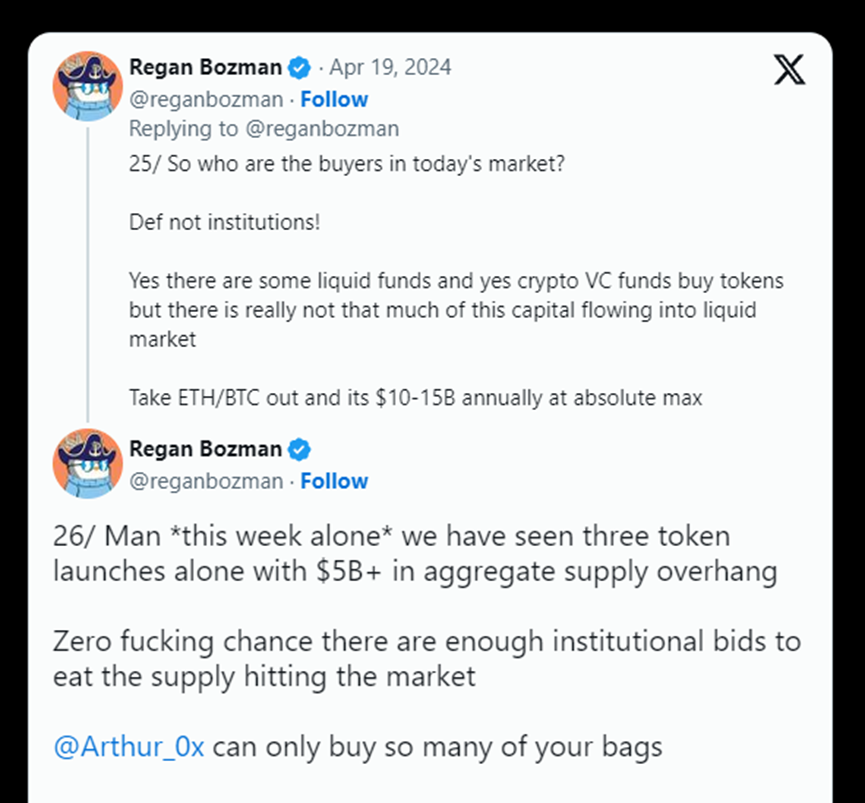
https://x.com/reganbozman/status/1781333623444300150
Billions unlocked, no new entrants
The following data should make you think twice:
• Vance’s napkin math suggests $200-300 billion of selling pressure from VCs in 2024+2025
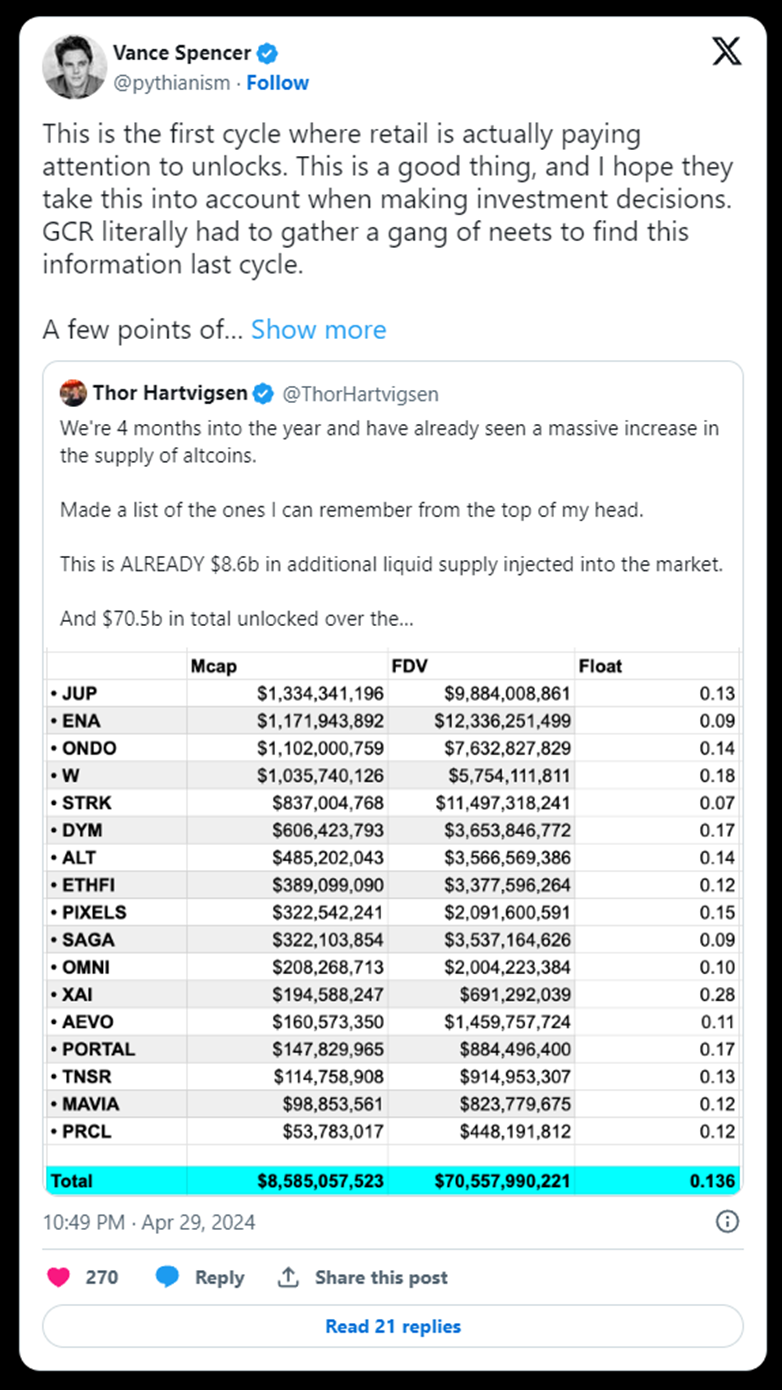
https://x.com/pythianism/status/1784958268420522195
• Coinbase’s Q2 report further proves that new market entrants don’t exist, at least not at scale
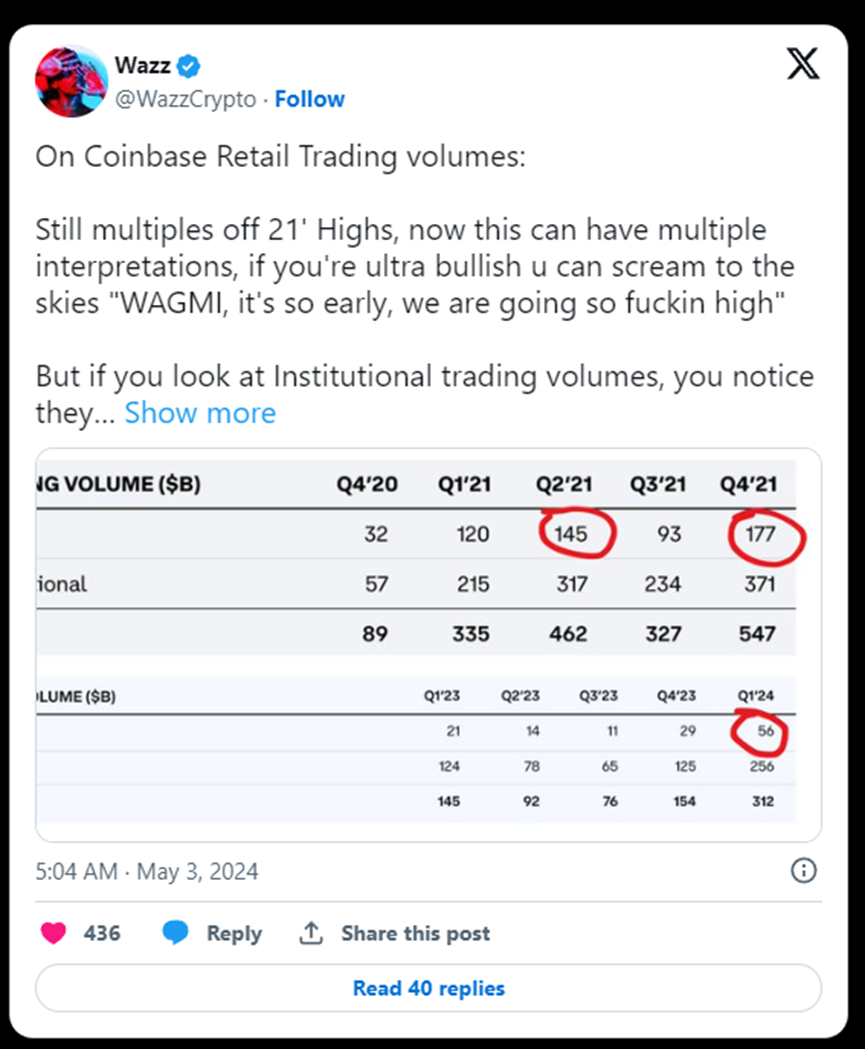
https://x.com/WazzCrypto/status/1786139849197551637
•Because there haven’t been a ton of new entrants in this cycle, venture capital has greatly exceeded the demand for these capital outcomes.
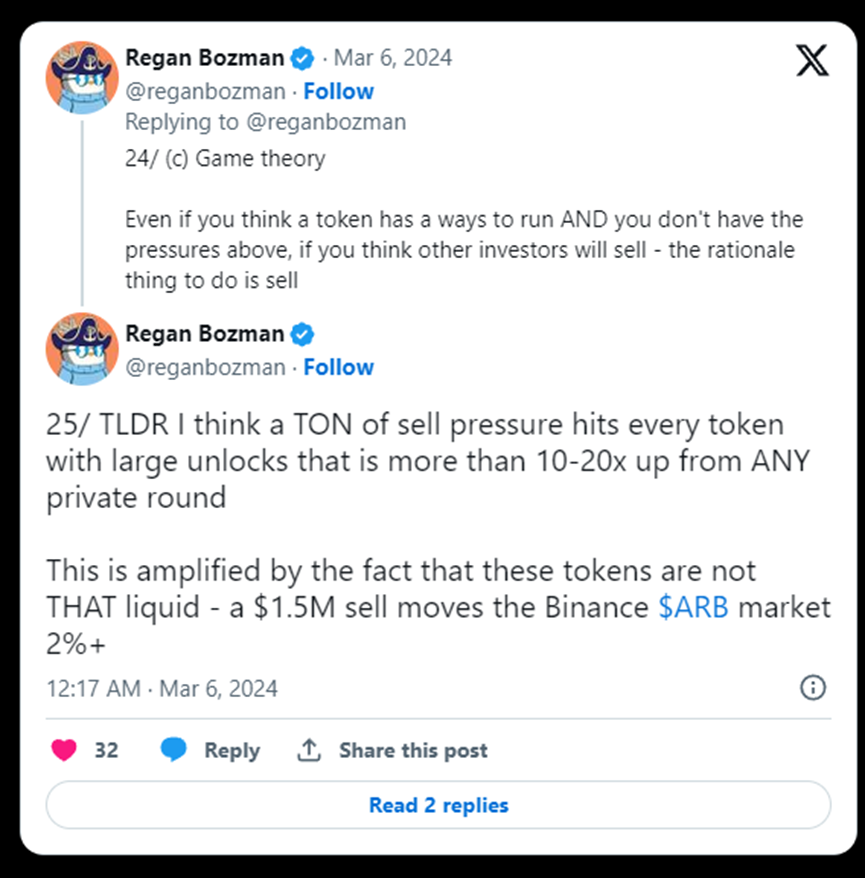
https://x.com/reganbozman/status/1765048896638824681
Since retail investors primarily own the long tail of crypto assets, institutional liquidity coming in via Bitcoin ETFs will not bid on these markets. Capital recovery from crypto natives dumping their $14k BTC purchases on Larry Fink can support these assets for a while, but it’s all internal capital from PVP-capable players who know how unlocks work, and how to avoid them.
The impact of the US SEC
By limiting the ability of startups to raise funds and distribute tokens more freely, the SEC is encouraging capital to flow into private markets where there are fewer regulatory constraints.
The SEC’s corrupt and overbearing nature of tokens is undermining capital value on the public markets, as startups are unable to trade their tokens for public market capital without triggering wholesale changes to their legal teams.
Cryptocurrency moves towards compliance
As encryption technology has evolved, it has slowly become more compliant.
When I got into the cryptocurrency space, during the ICO craze of 2017, ICOs were touted as a way to democratize investing and access capital. The ICO certainly evolved into an exploited scam, but it’s a story nonetheless that forced me and many others to recognize the potential that crypto could bring to the world. But the ICOs ended when it became clear that regulators were treating these transactions as unregistered securities sales.
The industry then turned to liquidity mining and went through a similar process.
With each cycle, crypto manages to obfuscate its methods of distributing tokens to the public, and with each cycle, hiding this process becomes more difficult. This process is critical to the decentralization of the project and the nature of our industry.
This cycle has been the most relentless regulatory focus we’ve ever seen, and as a result, lawyers for venture-funded startups face the biggest compliance challenge the industry has ever seen: distributing tokens to the public without getting sued by regulators.
break the balance
Regulatory compliance tilts the fulcrum of the public-private market toward the private side, as startups can choose to accept venture capital rather than potentially violating securities laws.
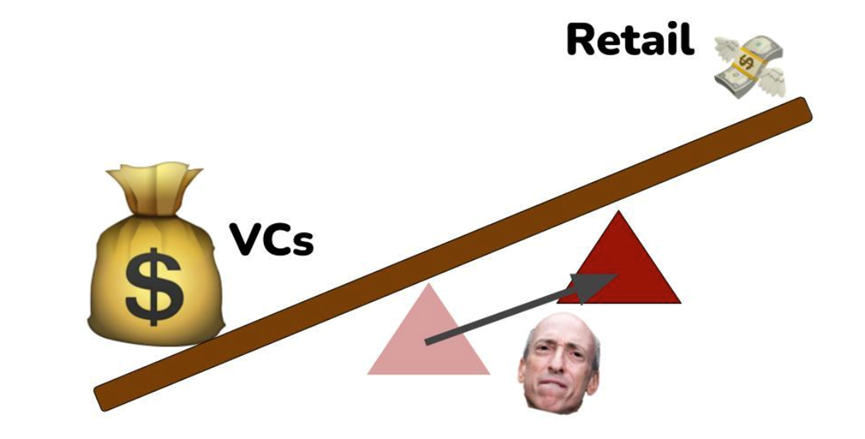
Where the fulcrum for balancing private and public capital lies depends on how tightly regulators clamp down on the crypto market.
•If there is no investor certification law, then this fulcrum will be more balanced.
•If there is a clear regulatory path to compliant token issuance, the differences between public and private markets will become smaller.
•If the SEC hadn’t engaged in the war on cryptocurrencies, we would have a more fair and orderly market.
Since the SEC won’t provide clear rules of the road, we’ll end up with a complex and convoluted “points” that won’t satisfy anyone.
Points are an unfair and disorderly market
“Points” make it unclear to retail users what they actually received because if there was a clear definition of what a point actually was (a claim on tokens), the team would expose themselves to possible securities law violations (from the perspective of the arrogant and corrupt SEC regulators).
Points do not provide investor protection, because in order to provide investor protection, the process first needs to obtain regulatory legitimacy. Due to this extremely bad conclusion, we found the debate between Sybil and the community, and LayerZero was caught in a dilemma.
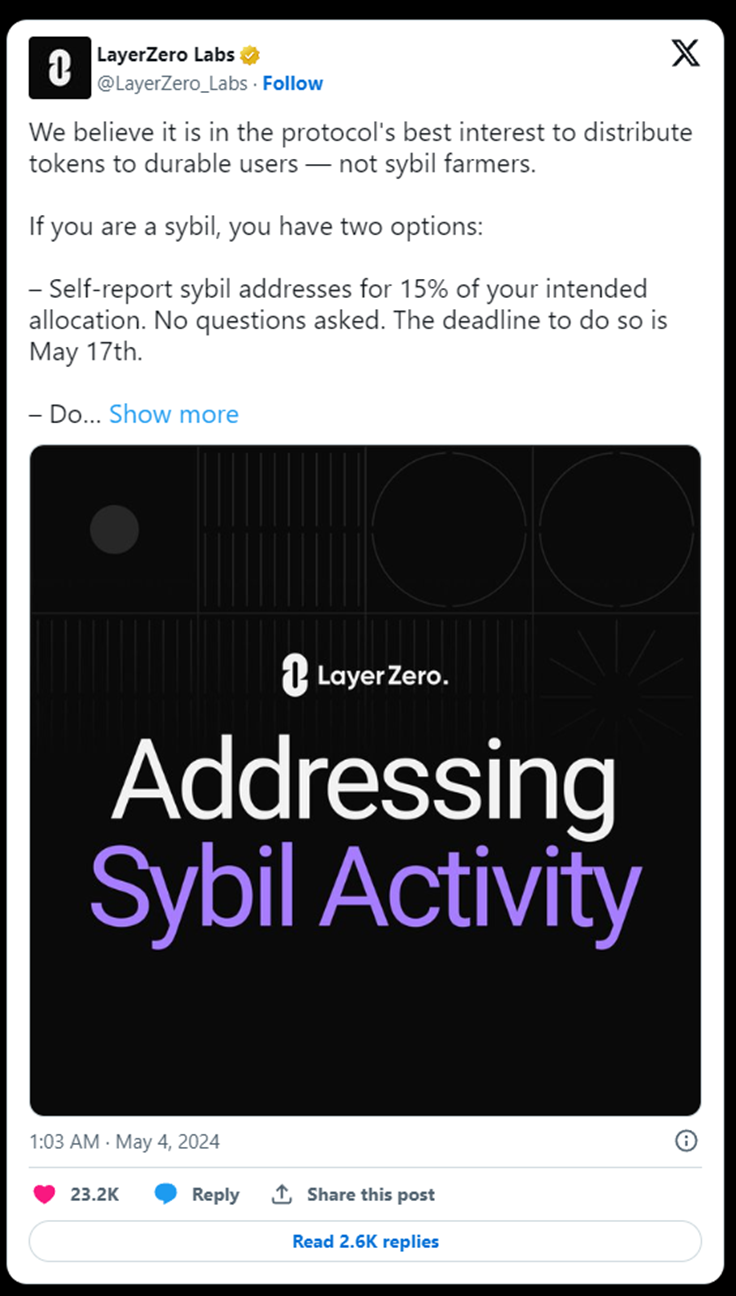
https://x.com/LayerZero_Labs/status/1786441554816532646
LayerZero recently announced a program for Sybils to self-report their Sybil attacks on upcoming LayerZero airdrops, which prompted Kain Warwick to write this article defending Sybils as a group of people who strongly support LayerZero’s metrics and improve LayerZero’s perceived position in the market.
In reality, there is no boundary between community members and witches. Since regular crypto participants cannot participate in private markets, the only way for them to gain exposure is through commitment and meaningful activity on the platform whose tokens they want.
Without simply enabling small investors to write small checks in early crypto projects, current token launches force users to sell into projects they are bullish on. As a result, there is no “community” that bands together to get rich in this cycle like LINK in 2020 or SOL in 2023. Current token launches do not provide support for communities to gain early exposure at low valuations.
In response, Twitter mobs attacking airdrop startups have become increasingly common — a logical consequence of the community’s inability to express their desire to be valid stakeholders in the project. “No taxation without representation!”
This doesn’t even include another snake lurking in the grass: mercenary capital exploitatively mining tokens for dumping. Small investors don’t have the ability to invest in the early stages of startups, and these highly aligned investors have to compete with toxic mercenary miners for airdrops without any discernible difference between the two.
The impossible balance
The "points" have become too explicit to be sustainable. The SEC and the crooks have come to support it, both trying to use it to their own advantage.
We will have to move to a different strategy, hopefully a more thoughtful one that makes many early community stakeholders rich while also not incurring the wrath of the SEC. Sadly, without regulation of token issuance, this is a pipe dream.







